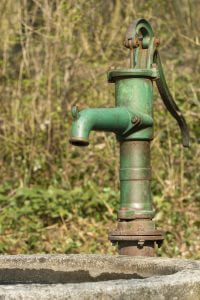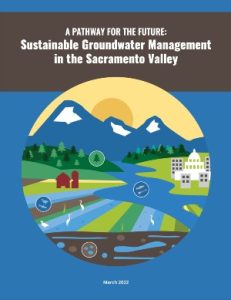By Jim Mayer, Chair, NCWA Groundwater Management Task Force; and Board Member, Yolo County Flood Control and Water Conservation District
With the Sacramento Valley facing an unprecedented dry year – particularly on the west side where little or no surface water is available – concerted efforts are being made to carefully manage groundwater resources for communities and farms this summer, while keeping an eye toward longer-term regional sustainability of water resources. This is not an accident.

Last fall, the Northern California Water Association convened three scenario planning sessions working with state and federal agencies and conservation partners to identify early actions, cooperative approaches, and creative partnerships that could help mitigate the economic, social and environmental impacts should 2022 turn out to be another dry year.
This process explored opportunities from ridgetop to river mouth to protect our communities, jobs and ecosystems from further harm in the short run while strategies are pursued to achieve long-term resilience in the face of a changing climate.
The third session focused specifically on groundwater and produced four immediate priorities for implementing the Groundwater Sustainability Plans (GSPs) approved by local agencies this winter and submitted to the State for review. Those priorities, detailed below in A Pathway for the Future: Sustainable Groundwater Management in the Sacramento Valley, are:
- Ensure safe drinking water for communities
- Advance groundwater recharge opportunities
- Better understand and manage surface water and groundwater interaction.
- Align state and federal priorities with local and regional needs.
Now in real time, NCWA also is supporting efforts by counties and Groundwater Sustainability Agencies (GSAs) to coordinate well permitting consistent with the provisions in the Governor’s recent Executive Order. See Drought Well Permitting Requirements, Drought Executive Order N-7-22.
The leadership in the Sacramento Valley, in our pursuit of overall resource resiliency, realizes the imperative to prevent all of the undesirable results described in the Sustainable Groundwater Management Act (SGMA), such as subsidence.
Overall, the scenario sessions renewed NCWA’s focus on the natural infrastructure of the Sacramento Valley—including the vast aquifer systems— and our commitment to develop more nature-based solutions to ensure sustainability.
The Northern California Water Association (NCWA) is working to bring the region together to actively manage our water resources—both surface and groundwater—for multiple benefits that ensure sustainable water supplies for cities and rural communities, farms, fish, birds, recreation, and hydropower. In managing water from the ridgetop to the river mouth, we fully appreciate and embrace the Sacramento Valley’s natural infrastructure, including our groundwater aquifer systems and their relation to both our rivers and creeks and the landscape that supports these vital rivers and creeks.





